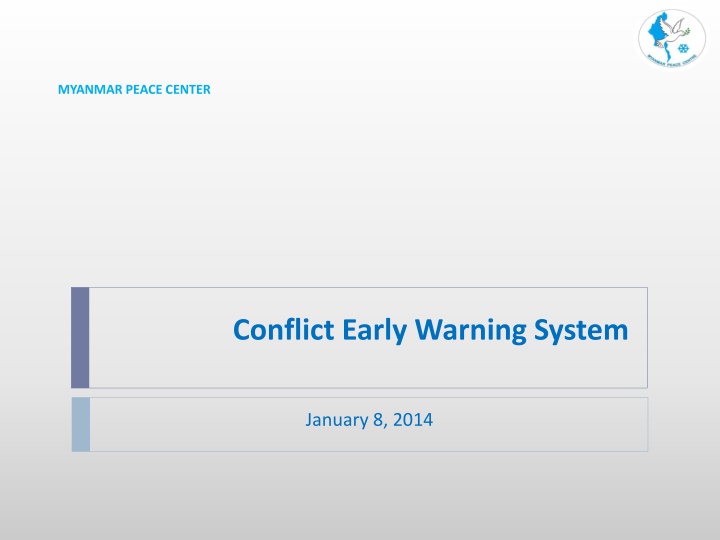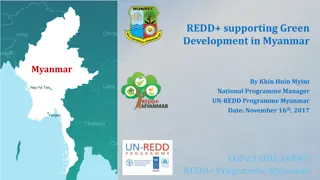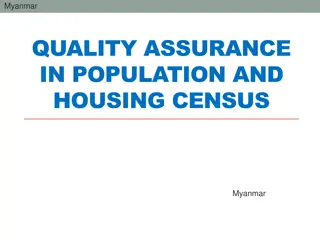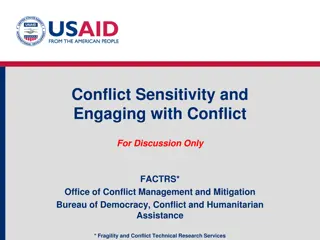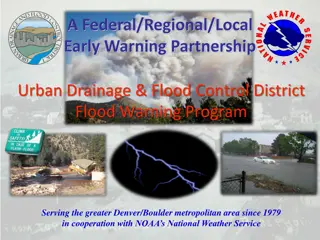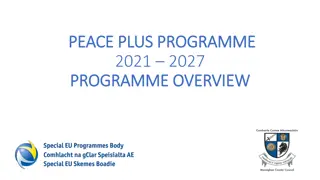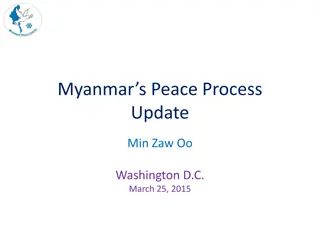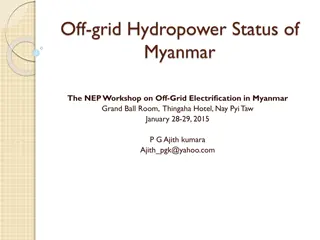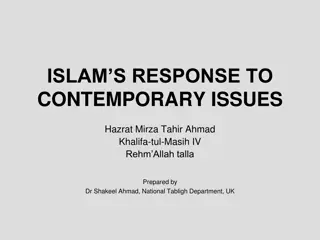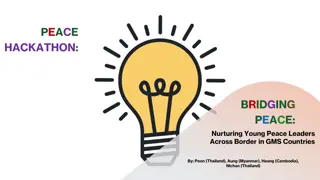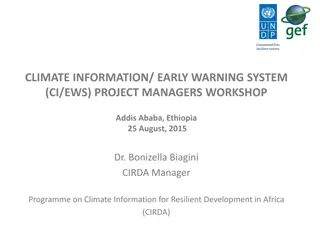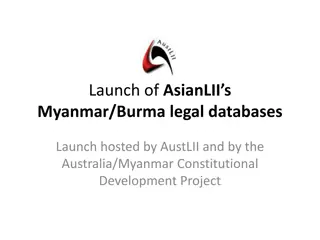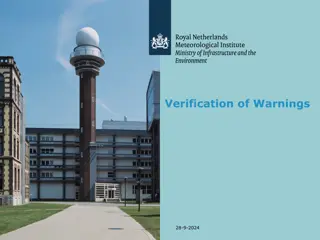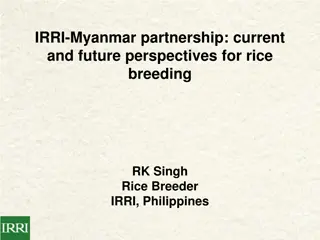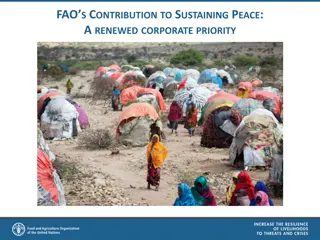Myanmar Peace Center Conflict Early Warning System Overview
The Myanmar Peace Center (MPC) plays a crucial role in conflict prevention and resolution by establishing a Conflict Early Warning System (CEWS). This system monitors and reports conflict indicators, promotes an understanding of violent conflict impacts, and alerts stakeholders of potential conflict outbreaks. The CEWS aims to increase awareness of conflict occurrences, enhance preventative peacebuilding initiatives, and reduce tensions in conflict-affected communities.
Download Presentation

Please find below an Image/Link to download the presentation.
The content on the website is provided AS IS for your information and personal use only. It may not be sold, licensed, or shared on other websites without obtaining consent from the author.If you encounter any issues during the download, it is possible that the publisher has removed the file from their server.
You are allowed to download the files provided on this website for personal or commercial use, subject to the condition that they are used lawfully. All files are the property of their respective owners.
The content on the website is provided AS IS for your information and personal use only. It may not be sold, licensed, or shared on other websites without obtaining consent from the author.
E N D
Presentation Transcript
MYANMAR PEACE CENTER Conflict Early Warning System January 8, 2014
Contents MPC Structure CFNI Structure Conflict Early Warning System concept overview Information management requirements Challenges Questions
The Myanmar Peace Center (MPC) Established to assist the Union Peace-making Central Committee and the Union Peace-making Work Committee for the peace process. Serving as the focal point for international partners and civil society organizations on issues related to the peace process. Facilitating dialogues between government and non-state actors.
Union Peace-making Central Committee Union Peace-making Working Committee MPC committee Special Advisors Donor Support Group (Govts, IOs, NGOs, Projects, Experts) Executive Director Independent International Experts Program Director(s) / Assoc. Program Director(s) Asst. Executive Director Ceasefire Negotiation Program (CFN) Peace Dialogue Program (PD) Peace Building Operations Coordination Program (PBOC) Government Relations IO & NGO Relations Private Sector Relations Operations Outreach and Public Diplomacy Program (OPD) Myanmar Mine Action Centre (MMAC) Administration and Support Division (ASD) Negotiations Implementation Regulation Monitoring Training Meetings Negotiations Dialogues Process Control Research Training Advocacy, Communications and Social Mobilization Networking News Room Media Production Social Media Mine Risk Education, Demining, Victim Assistance, Advocacy and Stockpile Destruction Administration Finance Logistics Support Services Security Legal Seconded International Experts
Ceasefire Negotiation and Implementation (CFNI) CFNI (Program Director) Program Manager Consultants Capacity Building Early Warning Coordination and Liaison Monitoring
Conflict Early Warning System (CEWS) Early warning is a process that: (a) systematically monitors and reports conflict indicators; (b) promotes an understanding among decision-makers of the nature and impacts of violent conflict; and (c) alerts stakeholders of the potential outbreak, escalation, and resurgence of violent conflict
Conflict Early Warning System (CEWS) CEWS Objectives: Increase government, NGO, EAG and CSO awareness of the occurrence and/or likely occurrence of conflict Increase the number and effectiveness of preventative peacebuilding initiatives in conflict-affected communities Reduce local tensions through directly supporting community peacebuilding initiatives Enhance awareness of the drivers of conflict particularly amongst government and donor agencies
Conflict Early Warning System (CEWS) CEWS Objectives: Increase accountability amongst the protagonists of conflict through public diplomacy and awareness Reduce the spread of rumours and accusations between groups that can be detrimental to the peace process Improve the exchange of information between government and ethnic armed groups, in conjunction with joint monitoring mechanisms
CEWS Outputs Daily update a short qualitative snapshot of any key events from the previous 24 hours. Ad hoc situation reports updates published as required in the event of significant challenges to the security environment Weekly update quantitative and qualitative update of reporting across the previous week. Geographic focus on identified hotspots with an update of each area s stability index . Monthly overview in-depth analytical review focussing on the drivers of conflict, including recommended action for preventative policy solutions. Geospatial mapping conflict data, stability index and key indicators will be updated near- real time via online mapping software. Data to be linked to key nodes via VPN connection. Conflict drivers workshops monthly briefing session based on in-depth analysis with key implementation partners. Flexible peacebuilding fund support to NGOs and local CSOs working on preventative/peacebuilding measures. - to be informed by EWS analysis, in consultation with donor partners. External research and assessment in addition to the routine analysis within the EWS, the MPC will commission specialised research and assessment on issues identified as particular inhibitors to stability. The tailored field-based research will be used to inform policy advocacy strategies, and also to shape priorities for the MPC s flexible peace fund.
MYANMAR PEACE CENTER MYANMAR PEACE CENTER Early warning in context
Information management Access database automated algorithms web-based reporting/GIS Multiple sources of information Verification required/duplication must be minimised Data ownership/security Long-term media monitoring automation
Challenges Database/software development Resource intensive nature of manual data input Event verification Accuracy/reliability of source data particularly to the township level Linking information to response mechanism
